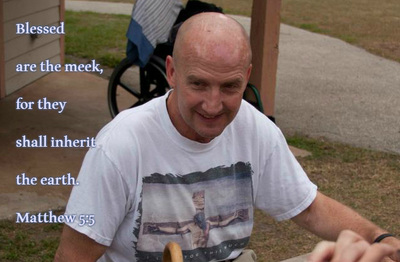Ezekiel suffered many things as the Lord’s prophet. He was mute and bound unless prophesying, he had stayed in uncomfortable positions for very long periods of time, eaten disgusting foods, and no one listened to him because the words he gave were not the words they wanted to hear. But in chapter 24 Ezekiel experienced one of the worst events I can imagine he had to go through. Verses 15-18 read,
“The word of the Lord came to me: 16 “Son of man, behold, I am about to take the delight of your eyes away from you at a stroke; yet you shall not mourn or weep, nor shall your tears run down. 17 Sigh, but not aloud; make no mourning for the dead. Bind on your turban, and put your shoes on your feet; do not cover your lips, nor eat the bread of men.” 18 So I spoke to the people in the morning, and at evening my wife died. And on the next morning I did as I was commanded.”
Ezekiel’s wife died suddenly. God described her as being the delight of Ezekiel’s eyes. Ezekiel loved her, but was not permitted to mourn publicly for her. In public he had to act as if nothing was wrong. He couldn’t honor his wife’s memory. He went out among the people, who knew if he was out and speaking there was a purpose. They all asked him why he was not grieving the death of his wife and why he was acting like everything was normal. He couldn’t accept condolences from anyone. He couldn’t even eat the casseroles his neighbors brought him but instead had to just keep going on as if his heart wasn’t broken. Verses 21-24 say,
“Say to the house of Israel, Thus says the Lord God: Behold, I will profane my sanctuary, the pride of your power, the delight of your eyes, and the yearning of your soul, and your sons and your daughters whom you left behind shall fall by the sword. 22 And you shall do as I have done; you shall not cover your lips, nor eat the bread of men. 23 Your turbans shall be on your heads and your shoes on your feet; you shall not mourn or weep, but you shall rot away in your iniquities and groan to one another. 24 Thus shall Ezekiel be to you a sign; according to all that he has done you shall do. When this comes, then you will know that I am the Lord God.”
The Temple would be taken by the enemy. The Temple was supposed to be dear to God’s people. It represented His presence among them, His favor of Israel as His very own people, and the relationship they should have shared. The taking of the Temple was the climax of the siege of Jerusalem. It meant that the enemy had won. It meant everything Ezekiel had prophesied had happened. Judgment had arrived.
But like Ezekiel had not mourned for his wife, Jerusalem and Israel would not mourn for the Temple. Although overwhelmed with despair, there was no time to cry and there was too much to cry for. Sons, daughters, and hopes of the future were dying in Jerusalem while the hearers were in captivity, helpless to do anything. And rather than lament their sins which had led to the judgment, they would play the blame game, as often happens when unpleasant incidents occur. They would grumble, complain and whine instead of properly grieving and taking responsibility for what had happened.
They would hear about when the Temple was profaned not by prophecy through Ezekiel but by an escapee from Jerusalem who would deliver the horrible news to them. They would know then it was real, it had happened, and they would hear a first-hand account of the atrocities that had taken place. God would give them a sign though. On the day the fugitive arrived to tell them the news, Ezekiel would no longer be mute, but would be able to speak whether he prophesied or not. And since Jerusalem had been destroyed, his prophecies would be about other subjects.
When catastrophic events happen to you or around, your response matters. Is your response graceful and compassionate or is it accusing and self-seeking? Does your reaction lead you to become more like Christ as you glean the lessons or does it lead others to hate Christ as you moan and groan?
Jesus wept when Lazarus died. People understood the deep love Jesus had for His friend. Mourning is allowed. But what is it that you are mourning? When tragedy comes into your life, do you cry over all you’ve lost and stay down like a victim or do you grieve your loss, reflect on it, get up and keep going?
We mourn, whine, grumble and complain about how bad our lives are. We focus on ourselves and don’t care about how the calamity might affect anyone else. We cry out ‘why me?’ and never listen for the answer. Or we choose to listen. We grieve the sins we have committed and that leads to repentance. We mourn the loss of people and things and we learn to go on without them. We let the Spirit comfort us. We lean on Him for understanding, peace and even joy through all of it.





 RSS Feed
RSS Feed
